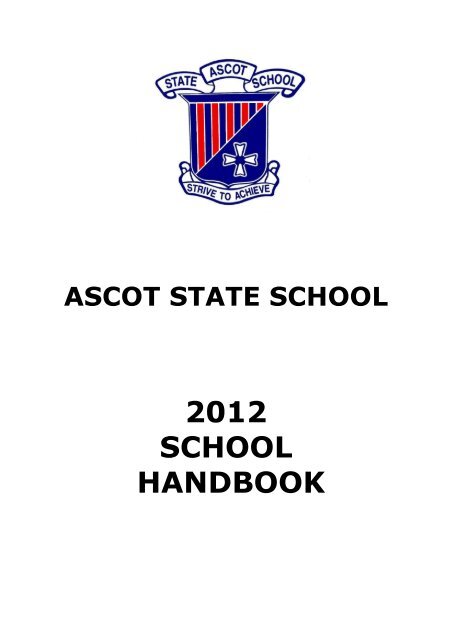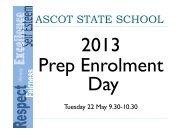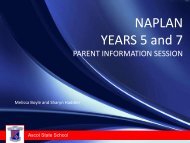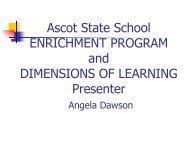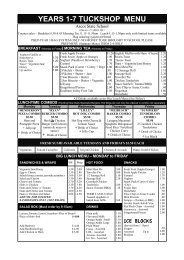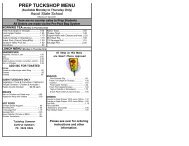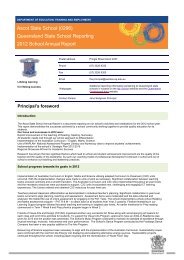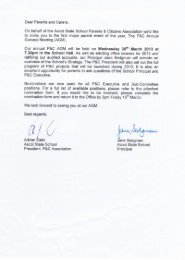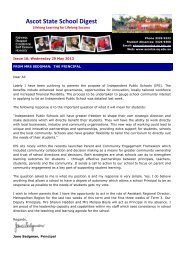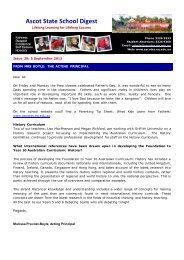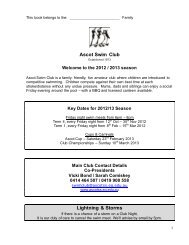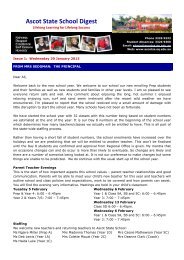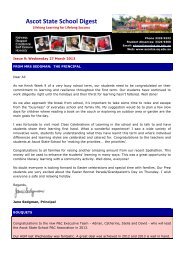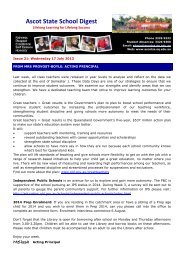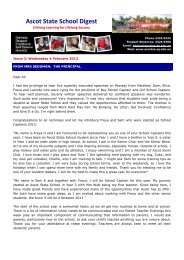Handbook - Ascot State School - Education Queensland
Handbook - Ascot State School - Education Queensland
Handbook - Ascot State School - Education Queensland
Create successful ePaper yourself
Turn your PDF publications into a flip-book with our unique Google optimized e-Paper software.
ASCOT STATE SCHOOL<br />
2012<br />
SCHOOL<br />
HANDBOOK
Strive to Achieve<br />
<strong>Ascot</strong> <strong>State</strong> <strong>School</strong><br />
Pringle Street<br />
<strong>Ascot</strong> QLD 4007<br />
Phone: 3326 9333<br />
Student Absence Line: 3326 9360<br />
Fax: 3326 9300<br />
Email: admin@ascotss.eq.edu.au<br />
Web: www.ascotss.qld.edu.au<br />
Information is current at time of print, but please be aware that<br />
changes can and do occur.<br />
2
Strive to Achieve<br />
Contents<br />
Page<br />
Principal’s Welcome 5<br />
<strong>School</strong> Profile 6<br />
Enrolment Management Plan 7-8<br />
<strong>School</strong> Programs:<br />
Music 9-10<br />
Library & Information Technology<br />
10<br />
Centre<br />
Information & Communication<br />
10-11<br />
Technology<br />
Languages Other Than English 11<br />
<strong>School</strong> Procedures:<br />
Enrolments 12<br />
Family Information 12<br />
New Children 12<br />
Attendance 13<br />
Arrival & Departure 13-14<br />
Assemblies 14<br />
Book Lists 14<br />
Homework 14<br />
Behaviour Management 15<br />
Religious <strong>Education</strong> 15<br />
Health & Safety 15-16<br />
Road Safety 16-17<br />
Emergency Procedures<br />
Emergency Contacts<br />
17<br />
17<br />
Money 17<br />
<strong>Ascot</strong> Digest 18<br />
Sports Houses 18<br />
Sport 18-19<br />
<strong>School</strong> Swimming Lessons 20<br />
Excursions 20<br />
Camps 20<br />
Lost Property 20<br />
Media 21<br />
Student Banking 21<br />
Volunteers 21<br />
Community <strong>Education</strong> 22<br />
Social Tennis 22<br />
Gifts, Donations, Fundraising 22<br />
3
Strive to Achieve<br />
Communication:<br />
Page<br />
Notice Boards 23<br />
Newsletter 23<br />
Parent/<strong>School</strong> 23<br />
Reporting & Assessment 23<br />
Year 2 Diagnostic Continuum 23<br />
Year 3, 5, 7 Nationwide Tests 23<br />
<strong>School</strong> Uniform 24-25<br />
Parents & Citizen’s<br />
Association:<br />
P&C Association 26-27<br />
Parent‟s Auxiliary 27<br />
Physical Environment 27<br />
Sports Days & Swimming Carnivals 28<br />
Tuckshop 28<br />
Uniform Shop 29<br />
Book Club 29<br />
Swim Club 29-30<br />
Coaching & Learn to Swim classes 30<br />
<strong>School</strong> Community Liaison Officer 30<br />
Outside <strong>School</strong> Hours Care 30<br />
Building Fund 30<br />
Friends of Music 31<br />
Friends of Physical <strong>Education</strong> 31<br />
Friends of Visual Arts & Design 31<br />
Bus Routes 32-33<br />
Privacy <strong>State</strong>ment 34-35<br />
Children & Young People in the Care of 36<br />
the <strong>State</strong> – Data Matching<br />
4
Strive to Achieve<br />
Principal‟s Welcome<br />
Welcome to the <strong>Ascot</strong> <strong>School</strong> Community. We hope your time here is<br />
challenging and rewarding for you and your children.<br />
<strong>Ascot</strong> <strong>State</strong> <strong>School</strong> believes in developing the potential of each individual<br />
child. We aim to promote and develop that capacity within an<br />
environment of care and support and through a range of opportunities<br />
within the broad education program.<br />
My staff and I are committed to the vision of the Department of <strong>Education</strong><br />
and Training - clever, skilled and creative <strong>Queensland</strong>. We are proud to<br />
be part of a strong public education system, which believes the purpose of<br />
education is to meet the needs of different students for high levels of<br />
educational attainment.<br />
At <strong>Ascot</strong> <strong>State</strong> <strong>School</strong> we take pride in the tradition and reputation of the<br />
school for pursuing the highest standards of behaviour of the students<br />
and in the academic program, the sporting program and the music<br />
program.<br />
Students are proud to wear their school uniform which is well recognised<br />
in the community and provides children with a sense of belonging. Our<br />
school motto Strive to Achieve plays an important part in fostering the<br />
wellbeing and personal development of each student.<br />
As we strive to achieve our potential in a supportive school environment<br />
we at <strong>Ascot</strong> value respect, honesty, fairness, self esteem and excellence.<br />
Our current key strategic objectives at <strong>Ascot</strong> are to provide:<br />
a challenging and relevant curriculum<br />
a supportive school environment<br />
the professional development and learning for staff<br />
integration of information communication and technology for<br />
learning<br />
facilities improvement<br />
Dimensions of Learning as our approach to teaching and learning<br />
effective partnerships.<br />
My staff and I look forward to working alongside you, our parents, to<br />
prepare our youth for the challenges of the future.<br />
Jane Sedgman<br />
5
Strive to Achieve<br />
<strong>School</strong> Profile<br />
<strong>Ascot</strong> <strong>State</strong> <strong>School</strong> is 6 km north-east of the city centre and central to the<br />
suburbs of <strong>Ascot</strong>, Hamilton, Clayfield, Albion and Newstead. The school was<br />
established in 1920. A non-compulsory Preparatory Year was introduced in<br />
2007.<br />
Physical Environment<br />
The school campus includes: 6 classroom blocks, Administration building,<br />
modern Library/Resource Centre, Activities Hall, Tuckshop, Covered Games<br />
Areas, 25m Heated Swimming Pool, Outdoor Covered Amphitheatre, Oval,<br />
Adventure Playgrounds, Art Room, Music Room and Computer Labs.<br />
<strong>School</strong> Community<br />
An enrolment management policy has been put in place to ensure that the<br />
student population matches current accommodation, facilities and grounds.<br />
Enrolments are initially taken from residents within a designated local catchment<br />
area (LCA). Enrolment of students who are outside the catchment area is via a<br />
waiting list.<br />
The school staff comprises: Principal, two Deputy Principals, class teachers all<br />
supported by a Teacher/Librarian, Support Teachers, Music Teachers, Physical<br />
<strong>Education</strong> Teachers, Language Other Than English (LOTE) Teacher and Teacher<br />
Aides. A Business Services Manager, Administration staff, Cleaners and a full<br />
time <strong>School</strong>s Officer (Facilities & Grounds) complement the teaching staff. A<br />
Guidance Officer, Speech Language Pathologist, an English as a Second<br />
Language Teacher and Instrumental Music Teachers visit on a rostered basis.<br />
Teacher Aide support is given to children needing individual attention throughout<br />
the school. Enrichment activities for students include: the Opti-Minds, Chess<br />
Club, Maths Team Challenge, Debating Club, High Achiever‟s Program, Young<br />
Scholars and individual studies.<br />
Visiting teachers of the visually impaired, hearing impaired and physically<br />
handicapped also visit our school when the need arises.<br />
There is strong community support for <strong>Ascot</strong> <strong>State</strong> <strong>School</strong>. Working beside the<br />
P&C Association are a number of Sub-Committees: Swim Club, Tuckshop,<br />
Parents‟ Auxiliary, Uniform Shop, Physical Environment, Friends of Music (FoM),<br />
Friends of Visual Arts & Design (FoVAD).<br />
The school and P&C employ a <strong>School</strong> Community Liaison Officer (SCLO) whose<br />
tasks include welcoming new families to our school community and coordinating<br />
activities with the Class Parent Representatives (CPRs) who support each<br />
classroom teacher.<br />
6
Rationale<br />
Enrolment Management Plan<br />
Strive to Achieve<br />
<strong>Ascot</strong> <strong>State</strong> <strong>School</strong> recognises as its prime obligation the provision of access to<br />
an appropriate educational service for students residing within this community as<br />
defined by its local catchment area. Because of enrolment capacity and growth<br />
<strong>Ascot</strong> <strong>State</strong> <strong>School</strong> may be unable to meet this obligation in future, unless action<br />
is taken now to manage enrolment. This plan sets out the conditions under which<br />
students may be enrolled into <strong>Ascot</strong> <strong>State</strong> <strong>School</strong>.<br />
Local catchment area<br />
The school's enrolment capacity for students who live outside the local<br />
catchment is dependant upon:<br />
the school's enrolment capacity<br />
catering for in-catchment enrolments<br />
allowing for in-catchment growth during the year<br />
ensuring an even spread of students across all year levels while maintaining<br />
class size targets.<br />
The local catchment area is based on equidistance boundaries with other<br />
schools. The attached map defines the boundary area for which <strong>Ascot</strong> <strong>State</strong> <strong>School</strong><br />
is the closest school by trafficable route. Should this capacity change because of<br />
changes to road networks, this will be formally notified through the registration<br />
and gazettal of an amended plan including the operative date for the new<br />
catchment area.<br />
Enrolment Policy<br />
All students who reside within the local catchment area and are eligible for<br />
enrolment in the educational program offered by the school have a right to<br />
enrolment at the school. The Principal will hold places for students who relocate<br />
to within the catchment boundary throughout the school year.<br />
Enrolment of students from outside the local catchment area will be managed to<br />
ensure that the total current and forecast enrolments do not exceed the school's<br />
current built capacity and where applicable will ensure there is an even spread of<br />
students across year levels or class groupings.<br />
The school's enrolment management plan does not replace other departmental<br />
policy; for example Safe, Supportive and Disciplined <strong>School</strong> Environment, nor<br />
does it override subsequent determinations regarding built school capacity.<br />
7
Strive to Achieve<br />
Enrolment Criteria<br />
Students who reside outside the school's local catchment boundary who apply<br />
for enrolment at the school will be put on a waiting list in order of receipt of<br />
application. Where there is spare capacity, students will be enrolled from the<br />
waiting list based on the following criteria and order of priority:<br />
Siblings of students already enrolled.<br />
Children and young people who are subject to child protection orders that<br />
grant guardianship or custody to the Chief Executive Officer of the Department<br />
of Child Safety.<br />
Students whose parent or legal guardian is employed by the school.<br />
Siblings of students already enrolled and living outside the guaranteed<br />
enrolment boundary will be enrolled.<br />
Students whose parent or legal guardian can show documentation that<br />
supports the notion that a principal place of residency was bought within the<br />
previous boundary up to 5 years prior to 1998 with the intent of enrolment and<br />
who continue to reside in that residence.<br />
8
<strong>School</strong> Programs<br />
Strive to Achieve<br />
The <strong>School</strong> Advisory Committee, comprising staff and parents, oversees the<br />
strategic direction of the school. All school programs are managed by the school<br />
personnel and supported by teachers, parents and administration. Programs<br />
are:<br />
English<br />
Mathematics<br />
Science<br />
Studies of Society<br />
The Arts<br />
Health & Physical <strong>Education</strong><br />
LOTE (Japanese)<br />
Technology<br />
ICTs<br />
Student Support<br />
Supportive <strong>School</strong> Environment<br />
Office Operations Management<br />
Facilities & Resources<br />
<strong>School</strong> Operations & Management<br />
Workplace Health & Safety<br />
Local Consultative Committee<br />
Music<br />
Music is an important part of the school curriculum at <strong>Ascot</strong> under the guidance<br />
of two classroom teachers of music assisted by visiting instrumental teachers.<br />
Three concert bands, a string ensemble and two choirs share in a love and<br />
appreciation of music.<br />
A strong feature of the school is the Instrumental Music Program provided by<br />
visiting instrumental music teachers.<br />
Instrumental Music<br />
Children from Years 3-7 have the opportunity to participate in the Instrumental<br />
Program FOR WHICH A FEE MAY APPLY.<br />
Year 3 - strings only. Free half hour lessons are conducted by an Instrumental<br />
teacher during the school day.<br />
Year 4 - strings continue. Woodwind lessons are conducted by two private<br />
teachers who teach groups of not more than 4 students at a nominal fee during<br />
the school day.<br />
Years 5 - 7 - strings, woodwind, brass and percussion. Free half hour lessons<br />
are conducted by Instrumental teachers from <strong>Education</strong> <strong>Queensland</strong> during the<br />
school day.<br />
Children receiving lessons at school must:<br />
participate in a string ensemble or concert band appropriate to their standard<br />
take part in concerts and other school activities<br />
attend lessons and rehearsals regularly as required<br />
keep instruments in good repair.<br />
Parents are required to provide tutor books, reeds, strings and other accessories<br />
as requested by the Instrumental teachers.<br />
9
Strive to Achieve<br />
Selection of students<br />
At the beginning of each year, a letter is sent home to all parents whose children<br />
have expressed an interest in learning an instrument. Where applications<br />
exceed places in the program, a selection process is utilised.<br />
(For more information a music handbook is available from the Music<br />
Teacher.)<br />
Library and Information Technology Centre<br />
The Library and Information Technology Centre is modern, spacious, fully air<br />
conditioned and equipped with the latest in information and communication<br />
technology. The centre has over 300 visitors daily and can accommodate 3 class<br />
groups at any time.<br />
The Library is home to a large collection of children‟s literature, information<br />
books and teacher resources. Use of the Library provides all children with the<br />
opportunity to develop literacy skills and a love of literature. All classes have<br />
weekly timetabled borrowing times. Children can also borrow library books<br />
independently as often as they wish and all loans are for a maximum of two<br />
weeks. Independent borrowing times are before school from 8.30-8.50am and<br />
at lunchtime from 1.15-1.40pm. All children must use a waterproof library bag<br />
as per the book list. Suitable library bags are available for purchase from the<br />
school Uniform Shop and the Library.<br />
A Computer Lab and separate Multimedia Classroom are an integral part of the<br />
Library. Classes are timetabled in the Library Computer Lab on a weekly basis.<br />
The Computer Lab incorporates 30 computers and an integrated data projector,<br />
screen and speakers to assist classes learning to use the latest technologies. The<br />
purpose-built Multimedia Classroom operates on a flexible booking system and<br />
features an integrated interactive whiteboard, data projector and speakers. This<br />
room has laptop, video and DVD capabilities.<br />
The Library design, layout and furniture have also been carefully selected to<br />
cater for the various age groupings from Prep to Year 7. The use of bright,<br />
lively colours and clever furniture design make the Library appealing to all ages.<br />
Information & Communication Technology (ICT)<br />
Information & Communication Technology is embedded across all Key Learning<br />
Areas at <strong>Ascot</strong> <strong>State</strong> <strong>School</strong>. Teachers incorporate use of a range of ICTs into<br />
class activities on a daily basis. Classroom programs include:<br />
teaching of specific ICT skills and processes under the ICT Expectations for<br />
Students<br />
use of a wide range of hardware i.e. interactive whiteboards, computers,<br />
laptops, digital cameras, video cameras, Wii consoles, ipods and dsi consoles.<br />
use of a wide range of functional and creative software e.g. Kid Pix,<br />
10
Strive to Achieve<br />
Inspiration, Kidspiraton, Microsoft Office, Paintshop Pro, Movie Maker, Photo<br />
Story and online software<br />
on-line learning and communication through the Department of <strong>Education</strong> and<br />
Training‟s secure environment “The Learning Place” e.g. email, virtual<br />
classroom, on-line chats and blogs<br />
internet safety (cybersafety) and online research skills.<br />
Parents sign a “Network Usage Agreement” outlining conditions of use and<br />
security controls for the Department of <strong>Education</strong> and Training‟s computer<br />
network and a “Consent form” relating to the publishing of student work and<br />
images.<br />
Each classroom has continual access to ICTs through pods of classroom<br />
computers, computer labs, laptops, mobile devices and digital tools and devices.<br />
Extra-curricular ICT activities include a Robotics Club, animation Club and<br />
Computer Club.<br />
Currently parents help to support the ICT program through a voluntary<br />
contribution scheme.<br />
Languages other than English<br />
Specialist teachers teach Japanese language to students in Years 3 - 7. LOTE<br />
covers cultural awareness and language awareness. At times the LOTE program<br />
has volunteer assistant teachers who introduce students to the Japanese<br />
language and culture. <strong>Ascot</strong> <strong>State</strong> <strong>School</strong> has a sister city relationship with<br />
Miyoshi town in Japan. Every year, Junior High school students homestay with<br />
<strong>Ascot</strong> families and every couple of years an outbound trip is offered.<br />
11
Strive to Achieve<br />
<strong>School</strong> Procedures<br />
1. Enrolments 15. Money – Term Accounts<br />
2. Family Information 16. <strong>Ascot</strong> Digest<br />
3. New children 17. Sports Houses<br />
4. Attendance 18. Sport<br />
5. Arrival & Departure 19. <strong>School</strong> Swimming Lessons<br />
6. Assemblies 20. Excursions<br />
7. Book Lists 21. Camps<br />
8. Homework 22. Lost Property<br />
9. Behaviour Management 23. Media<br />
10. Religious <strong>Education</strong> 24. Student Banking<br />
11. Health & Safety 25. Volunteers<br />
12. Road Safety 26. Community <strong>Education</strong><br />
13. Emergency Procedures 27. Social Tennis<br />
14. Emergency Contacts 28. Gifts, Donations and Fundraising<br />
1. Enrolments<br />
<strong>School</strong>: Children must be 6 years old on or before 30 June of the year of<br />
enrolment into Year 1 at a <strong>State</strong> <strong>School</strong>. Because of restricted facilities, there is<br />
an enrolment management plan in place. Please contact the office to enquire<br />
about eligibility for automatic entry or to add names to the waiting list.<br />
Preparatory Year: Children must be 5 by 30 June in the year they start Prep.<br />
In 2007 Prep replaced preschool in <strong>Queensland</strong>.<br />
It is a full-time program and children attend from Monday to Friday during<br />
normal school hours, from 8:45am – 2:45pm.<br />
Prep is integrated fully into the rest of the school. Classrooms and other facilities<br />
are located in school grounds.<br />
2. Family Information<br />
Upon enrolment information is recorded for use in emergencies, e.g. address and<br />
telephone numbers for immediate contact. TO AVOID SERIOUS DISTRESS FOR<br />
YOUR CHILD IT IS ESSENTIAL THAT THE INFORMATION BE KEPT UP TO DATE.<br />
3. New Children<br />
Each class allocates host children to welcome new children and show them<br />
around the campus and help them make friends and settle in quickly to the<br />
school routine.<br />
12
Strive to Achieve<br />
4. Attendance<br />
Punctuality and regularity in attendance are essential. Those children who do<br />
not attend regularly are placed at a disadvantage throughout their school life.<br />
When a child is absent through illness or other causes, a note to the class<br />
teacher or call to our 24 hour Student Absence Line (3326 9360) is required.<br />
Where absence from school is likely to be prolonged, it is required that the<br />
school be advised as soon as possible.<br />
When a child arrives late to school they must be signed in as a Late Arrival at the<br />
school Administration office.<br />
5. Arrival and Departure<br />
Parents are advised that children should not arrive at school before 8.30am as<br />
playground equipment is out of bounds. Students who arrive at school before<br />
8.30am wait in the Covered Games Court until the bell rings. Children should be<br />
ready to begin work in class by 9.00am.<br />
Lunch breaks are 11:00 – 11:30am and 1:00 – 1:40pm. The first fifteen<br />
minutes of each break is a supervised eating time. <strong>School</strong> finishes at 3:00pm.<br />
Prep students attend school from 8.45am until 2:45pm.<br />
After school, children waiting for their parents move to their respective pick up<br />
area. We have a travel safe program to ease the traffic problem. Children going<br />
to After <strong>School</strong> Care assemble under the Years 6 & 7 building. Children using<br />
buses are to go as quickly as possible to their bus stop. Excellent behaviour is<br />
expected on buses. Bus routes are included later in the handbook. Children are<br />
not to play in the playground at this time as there is no supervision. Those<br />
being collected by car go to Pringle Street or Massey Street and stand behind the<br />
“yellow line” – parents drive past and children walk out to their car when it<br />
arrives at the head of the line. At 3.20pm a bell is rung and any child not<br />
collected waits outside the Administration building.<br />
These rules are made for the safety and well being of children. Children catching<br />
a bus, wait at the respective bus stops. Children are expected to behave well on<br />
the way to and from school, particularly on public transport. A bike cage is<br />
situated on the oval for children riding to and from school. Bikes need to be<br />
chained for security.<br />
Parents who have work or other commitments and require supervision for their<br />
children outside of school hours can contact the After <strong>School</strong> Hours Care<br />
provided by PCYC.<br />
The Passenger zones in Pringle and Massey Streets are designated two minute<br />
drop-off and pick-up areas for the safety of our children.<br />
13
Strive to Achieve<br />
<br />
<br />
<br />
<br />
<br />
<br />
TO USE THE 2 MINUTE PASSENGER ZONES CORRECTLY<br />
DO<br />
DO NOT<br />
Plan your trip to avoid arrival at peak Leave your car<br />
times (8.30 am and 3.00-3.10 pm) Double park<br />
Pull in<br />
Stay more than two minutes<br />
Move up to the head of the queue Arrive early in the afternoon and<br />
Pick-up or drop-off children via the car‟s sit in the zone.<br />
curb doors<br />
Move out safely<br />
If your children are not at your<br />
arranged spot, go around the block and<br />
try again.<br />
6. Assemblies<br />
These are held on Mondays. All Assemblies are hosted by a rostered class.<br />
Parents are welcome to attend any assembly. Senior assembly (Yrs 3-7) 9.00-<br />
9.30am; Junior Assembly (Yrs P–2) 10.30-11.00am<br />
7. Book Lists<br />
A list of requirements for each year level is provided prior to the close of the<br />
school year to ensure that children are fully prepared for the commencement of<br />
the new year. A service is provided by the school in fourth term whereby these<br />
requirements can be ordered and delivered to your home prior to the Christmas<br />
vacation.<br />
8. Homework<br />
Reading is the most important subject in the school curriculum and one of the<br />
easiest to supervise and encourage at home. Year 1 students will be able to<br />
read a little at night. Years 1 to 7 should do some reading every night and Years<br />
2 to 7 will have spelling to learn most nights. Teachers may set specific<br />
homework reflecting work done in the classroom. Some children may be<br />
required to complete unfinished class work at home.<br />
In Years 1, 2 and 3 set homework could be up to but generally not more than<br />
one hour per week.<br />
Homework in Year 4 and Year 5 could be up to but generally not more than two<br />
to three hours per week.<br />
Homework in Year 6 and Year 7 could be up to but generally not more than three<br />
to four hours per week.<br />
14
Strive to Achieve<br />
9. Behaviour Management<br />
A major objective of our school code is to develop self-discipline in each<br />
individual and an awareness of the effect of each person's behaviour on others.<br />
Rules are developed with a conscious concern for safety, tolerance, respect for<br />
and consideration of others. The school has a Code of Behaviour and a<br />
Responsible Behaviour Management Plan for students that outlines available<br />
support to help children manage their own behaviour.<br />
10. Religious <strong>Education</strong><br />
Classes are taken regularly by visiting instructors from a number of<br />
denominations. Parents who do not wish their children to participate in these<br />
classes are requested to notify the class teacher in writing. Alternative<br />
arrangements will be made for these students during Religious <strong>Education</strong><br />
lessons. A fee is requested annually for set resources.<br />
11. Health & Safety<br />
Infectious Diseases: Children suffering from infectious disease (chicken pox,<br />
measles, school sores, etc.) may be excluded from school for varying lengths of<br />
time. Here are extracts from the exclusion table provided by the National Health<br />
and Medical Research Council.<br />
DISEASE<br />
Measles<br />
Chicken Pox<br />
Mumps<br />
Rubella<br />
Ringworms, scabies,<br />
fungal infections<br />
Head Lice<br />
PUPILS SHALL BE EXCLUDED FROM SCHOOL<br />
Excluded for at least four days after THE RASH BEGINS.<br />
Unimmunised contacts should be excluded for fourteen<br />
days from the first day of appearance of the rash in the<br />
last case.<br />
Excluded for at least five days after the rash first<br />
appears or until dry scabs have replaced all blisters.<br />
Excluded until nine days after the onset of swelling or<br />
until the swelling disappears (whichever is sooner).<br />
Excluded until fully recovered and until at least four<br />
days after the onset of the rash.<br />
Exclude until the day after appropriate treatment has<br />
commenced.<br />
Parents are advised that it is their responsibility to treat<br />
the problem of head lice if it occurs. Notification is sent<br />
home to all students in an affected classroom. All<br />
parents are then expected to check and treat for head<br />
lice.<br />
15
Strive to Achieve<br />
Medication: If a child requires prescribed medication while at school, <strong>Education</strong><br />
<strong>Queensland</strong>‟s regulations state that:<br />
1. The parent or guardian must in the first instance make a written request to<br />
the Principal of the school. Authority forms must be completed at the school<br />
office.<br />
2. The student‟s medication, with the pharmacist‟s written instruction on the<br />
container must be lodged with the school for security purposes.<br />
3. Administration of that medication will be carried out by an adult staff member<br />
designated by the Principal. Non-prescribed medications should not be<br />
brought to school and will not be administered by school staff.<br />
Sun Safe: “NO HAT, PLAY IN SHADE”.<br />
Visit by <strong>School</strong> Sister: A Registered Nurse from the <strong>State</strong> Department of Child<br />
Health visits the school annually to examine children in Prep. Parents are<br />
notified if further medical advice should be sought.<br />
12. Road Safety<br />
A school crossing supervisor‟s scheme is in operation. The crossings in Massey<br />
and Anthony Streets are usually supervised before and after school,<br />
8.00-9.00am and 2.55-3.25pm in Massey Street and in Anthony Street<br />
8.15-8.45am and 2.55-3.25pm. Parents are asked to ensure that children use<br />
these supervised crossings.<br />
The Crossing Supervisors are there for the protection of our children. WAIT<br />
until the whistle has blown before crossing the road and ALWAYS cross at the<br />
crossing. The crossing supervisors are employed and trained by the <strong>State</strong><br />
Department of Transport.<br />
Road safety issues have a high profile at our school.<br />
Please obey parking regulations. Do not park over yellow lines.<br />
The two minute passenger zones are there for a good reason - TO ALLOW<br />
CHILDREN TO BE DROPPED OFF AND COLLECTED IN CLOSE PROXIMITY TO<br />
THE SCHOOL. PLEASE DO NOT ABUSE THIS PRIVILEGE.<br />
To use the two minute zones correctly - pull in, drive forward, stop to drop off<br />
or pick up at the head of the queue, pull out.<br />
Make sure that your children always use the car safety door - on the curb side<br />
Never double park.<br />
Never call your child across the road to you.<br />
16
Strive to Achieve<br />
There is increasing awareness of the importance of walking, cycling, public<br />
transport and carpooling for the economic, social and physical wellbeing of our<br />
communities. For the health and safety of our children the school encourages<br />
parents to adopt travel plans that reduce the traffic in and around the school<br />
precinct and increase physical activity:<br />
walk to school<br />
catch the bus to school<br />
carpool to school<br />
cycle to school.<br />
13. Emergency Procedures<br />
Drills are carried out at least once per semester to familiarise staff and students<br />
with procedures to be followed for evacuation or lock down of the school<br />
premises.<br />
The school has a Critical Incident Plan as required by the Department of<br />
<strong>Education</strong> and Training.<br />
14. Emergency Contacts<br />
Please ensure that you notify the office if you change your contact details. As<br />
part of our ongoing commitment to strengthen communication channels between<br />
school and home we have implemented a test messaging service. This forms<br />
part of our school critical incident plan and allows us to contact all parents<br />
simultaneously, should the need arise. For example, if a year level was late<br />
getting back from camp, we could send a text to all the parents informing them<br />
of the delay and the expected arrival time of the bus.<br />
This is only a one way message service from school to home. It is not possible<br />
for parents to text or call the school on this number. If you need to contact the<br />
school, please use the landline contact phone numbers. It is important that you<br />
add the school mobile number to the contacts list on your mobile. This way you<br />
will know that only messages from this mobile are genuine. The school mobile<br />
number is: 0488 438 215.<br />
Only texts from this number are to considered authentic messages from<br />
<strong>Ascot</strong> <strong>State</strong> <strong>School</strong>.<br />
15. Money<br />
A family account is sent home at the beginning of each term. The account will<br />
include all activities/excursions for your child/children allowing one payment to<br />
be made per term. Credit card and Eftpos facilities are available for payments as<br />
well as cash and cheque. If you wish to transfer funds electronically to the<br />
school account for payment of your account, please contact the office for the<br />
school bank account details. An email notification of funds transferred can be<br />
sent to: accounts@ascotss.eq.edu.au or faxed to 3326 9300.<br />
17
Strive to Achieve<br />
16. “<strong>Ascot</strong> Digest” - Newsletter<br />
A weekly publication “<strong>Ascot</strong> Digest” is sent home each Wednesday with the<br />
youngest child in the family. This informs you of school issues and contains<br />
information from the Principal, Date Claimer for each term, Tuckshop Roster,<br />
P&C News, articles from Sub-Committees and Groups, Sporting results, etc. It is<br />
also available on the school website. If you do not want your child‟s photograph<br />
to be featured in this publication, please advise the school in writing.<br />
17. Sports Houses<br />
Upon admission to the school, children are allocated to one of the four "houses".<br />
Families are allocated to the same “house”.<br />
HENDERSON (GOLD) - named after the foundation head teacher, Mr Thomas<br />
Henderson (1920-1939).<br />
LILLEY (BLUE) - named after a former Premier of <strong>Queensland</strong>, Sir Charles Lilley,<br />
who was also a Justice of this <strong>State</strong>. Sir Charles was one of the architects of our<br />
education system.<br />
MEIBUSCH (GREEN) - named after the second head teacher, Mr Robert E<br />
Meibusch (1939-1956).<br />
RYAN (RED) - named after a former Premier of <strong>Queensland</strong>, Mr Thomas Joseph<br />
Ryan, who was also a lawyer responsible for the establishment of the Arbitration<br />
Court.<br />
Each year, inter-house athletics and swimming competitions precede the district,<br />
regional and state carnivals. These are well supported by the school community.<br />
18. Sport - Interschool Sport<br />
The school is involved in a wide variety of sports. Track and field, swimming,<br />
softball, T-ball, netball, hockey, Australian Rules Football, flipper ball, touch<br />
football, tag football and cricket are among the sports involved. These sports<br />
are offered depending on student numbers, coaching expertise and the<br />
availability of teachers and district decisions. <strong>Ascot</strong> school participates in<br />
interschool sport within the City District on a seasonal basis. Children have the<br />
opportunity to trial for selection in school, district, regional and state teams.<br />
Most teams travel by bus to their venues. A sport fee is payable for both Winter<br />
and Summer sport. This fee covers transport, equipment and consumables, e.g.<br />
first aid for sport and is included in the term account. All students need a<br />
permission note to play and travel on Fridays.<br />
18
Strive to Achieve<br />
Criteria for Selection in Interschool Sporting Teams:<br />
General<br />
1. Attitude to the game<br />
2. Extra effort<br />
3. A willingness to attend training sessions to develop skills<br />
4. An ability to cooperate with coaches and team mates<br />
5. A willingness to play wherever required for the good of the team and to share<br />
games whenever necessary without complaint.<br />
Specific Selection Criteria:<br />
Netball<br />
landing<br />
balance<br />
turning ability<br />
movement in restricted space<br />
catching ability<br />
passing ability<br />
able to pass to a moving player<br />
ability to read play.<br />
Softball & T-Ball<br />
hand-eye coordination<br />
ability to place the batted ball away<br />
from fielders<br />
ability to run the bases quickly<br />
correct use of glove<br />
accurate catching and throwing<br />
ability to read play.<br />
Cricket<br />
batting ability - cut/pull/drive<br />
bowling ability - line/length<br />
fielding ability - throwing/catching<br />
keeping ability - stance/movement.<br />
Aussie Rules<br />
kicking<br />
marking<br />
bouncing ball while running<br />
ability to read play.<br />
Hockey<br />
hitting & pushing the ball<br />
trapping<br />
tackling<br />
movement around the ball<br />
ability to read play.<br />
Flipper Ball<br />
swimming ability<br />
hand – eye coordination<br />
stamina/fitness<br />
Sport - Intraschool Sport<br />
Recreational sport is offered to children not participating in interschool sport as a<br />
means of enhancing interest in active participation. Children who remain at<br />
school will be offered a variety of school based and commercial recreational<br />
activities. Commercial recreational activities will incur a transport / equipment /<br />
facilities cost.<br />
19
Strive to Achieve<br />
19. <strong>School</strong> Swimming Lessons<br />
Classes are timetabled for swimming lessons each week in Terms 1 and 4.<br />
Each student must provide togs, sun shirt, towel and plastic carrying bag.<br />
Girls are to wear 1 piece togs.<br />
Bathing caps are to be worn by swimmers, both boys and girls.<br />
Towels, togs and all articles of clothing are to bear the child‟s name.<br />
Children are not permitted to enter the water wearing hair clips, rings,<br />
bangles or other ornaments, which may come loose in the water.<br />
Children suffering from any kind of infection, sores, skin complaints or<br />
wearing band aids will be excluded.<br />
If a child cannot attend a swimming lesson a note to the teacher is<br />
required.<br />
Parent volunteers are needed for each class to assist with adult<br />
supervision requirements.<br />
20. Excursions<br />
Opportunity is taken to involve the community in school activities and to extend<br />
our children in educational experiences in the wider community. Field trips and<br />
excursions cover a wide range of cultural, social and academic objectives.<br />
Included in these activities are visits to orchestral concerts, plays, environmental<br />
centres, places of historical interest and the planetarium.<br />
At the school during the year there are performances by visiting artists and<br />
groups which have been approved by the Department of <strong>Education</strong> & Training.<br />
Buses are used to transport students on excursions. Each child will have a seat<br />
and no one is permitted to stand. Buses with seat belts are used for travel<br />
outside of the metropolitan area. However, as an optional safety feature and<br />
depending on availability and costs, buses with seat belts may be used for inner<br />
city travel.<br />
21. Camps<br />
Students in Years 4, 5, 6 and 7 annually attend year level camps.<br />
22. Lost Property<br />
Every effort is made to locate lost property, but parents need to cooperate by<br />
having their child's name plainly marked on every article of clothing and on<br />
school books and materials. Lost property is cleared at the end of each term.<br />
Many valuable articles remain unclaimed because owners cannot be identified.<br />
1. The amount of lost property handled each term is staggering<br />
2. Please name EVERY item your child owns<br />
3. A waterproof marker pen is ideal to mark anything plastic<br />
4. White out can be used to mark dark items such as the inside of hats<br />
5. Order form for washfast name tapes can be obtained from the Uniform Shop<br />
6. Lost Property is stored in a designated area.<br />
7. Unclaimed lost property will only be held for four weeks.<br />
20
Strive to Achieve<br />
23. Media<br />
Parents who prefer that their children do not appear in the media as students of<br />
<strong>Ascot</strong> <strong>State</strong> <strong>School</strong> should advise the school in writing.<br />
24. Student Banking<br />
Parent volunteers operate weekly (Wednesday) student banking at the school.<br />
This service encourages children to develop a saving habit and the school makes<br />
a profit on each transaction.<br />
25. Volunteers<br />
At <strong>Ascot</strong> <strong>State</strong> <strong>School</strong> we encourage parent participation in many levels of school<br />
life, including our real business of providing learning programs for children. It<br />
has long been recognized that parent involvement benefits children in terms of<br />
the feelings of belonging and security such involvement can bring. We are<br />
fortunate to have at <strong>Ascot</strong> <strong>State</strong> <strong>School</strong> the diversity of skills and talents that our<br />
parents are willing to share. Some areas in which parent involvement is crucial<br />
are the class reading and assistance with swimming supervision. Most of the<br />
time no more than an hour of time commitment each week is needed.<br />
Parents who would like to work with children as classroom volunteers are most<br />
welcome. Arrangements are generally made with the class teacher so that visits<br />
can be made on a regular basis. Your help in this regard will be most<br />
appreciated, particularly with the Prep-3 classes.<br />
To ensure there is no doubt about whether or not volunteers were in attendance<br />
in school at any particular time, it is essential that a Register of Attendance is<br />
maintained. This register will be kept in the school office and/or classroom to<br />
ensure that the school has an accurate record of when all volunteers are in<br />
attendance. This means that all volunteers who call in to help in classrooms,<br />
library, meetings etc must sign the book at the office, the tuckshop or in the<br />
classrooms.<br />
Each class has a class/parent representative to assist the teacher when<br />
requested with class activities, provide a channel of communication and promote<br />
the involvement of volunteers in the school community.<br />
Volunteer / Visitor badges<br />
Visitors/Volunteers are requested to present through the Administration to<br />
collect a “VISITOR” badge. Students and staff will be therefore aware of any<br />
person in the grounds without identification and will advise the Administration.<br />
Your cooperation in adopting these procedures will ensure your children can feel<br />
safe and secure in the school environment.<br />
We are always impressed by the large number of parents who provide invaluable<br />
assistance to the school and thank you for your continuing work.<br />
21
Strive to Achieve<br />
26. Community <strong>Education</strong><br />
Community <strong>Education</strong> aims to offer a wide range of educational and extracurricular<br />
activities for adults and children in the broader school community, and<br />
in so doing, provides income for the school through the rental of the school‟s<br />
facilities. Some of the activities that have been offered include: Netball,<br />
Swimming, French, Tae Kwon Do, Speech and Drama, Soccer, Tennis, Cricket,<br />
Martial Arts and Art Classes. Details of the various courses are distributed with<br />
the <strong>Ascot</strong> Digest the first week of each new term and the last week of each term<br />
for the forthcoming term. Extra copies are available on request. Enquiries can<br />
be directed to the Office.<br />
27. Social Tennis<br />
The <strong>Ascot</strong> <strong>State</strong> <strong>School</strong> tennis courts located in Reeve Street, Clayfield are<br />
available for use by the public.<br />
The courts can be booked through Mrs Munns 3262 4296 and the gate key<br />
collected from her front verandah (house to immediate right of tennis courts).<br />
Payment can be made to her or deposited in the honesty box on her verandah.<br />
Please lock courts when you are finished playing. A fee will be charged for lost<br />
or removed keys.<br />
28. Gifts, Donations and Fundraising<br />
All fundraising occurs through the P&C and its sub-committees.<br />
All donations are given to the P&C or school‟s Business Services Manager.<br />
Gifts over the accumulated value of $150 to school personnel must be registered<br />
via the Principal as per Code of Conduct Policy.<br />
22
Strive to Achieve<br />
Communication<br />
Anthony Street / Pringle Street Notice Board<br />
The “Red Board” advises the community of forthcoming school events.<br />
Newsletter ‘<strong>Ascot</strong> Digest’<br />
In order to keep parents fully informed of school activities the “<strong>Ascot</strong> Digest”<br />
newsletter, is produced each Wednesday and sent home with the youngest child<br />
of the family. It is also available via the <strong>School</strong> website on the Internet.<br />
Parent / <strong>School</strong><br />
Communication between parents and the school is encouraged. With a desire to<br />
promote open and harmonious relationships within the school and the wider<br />
community every effort is made to encourage worthwhile communication levels.<br />
It is hoped that parents will become acquainted with their teachers and the<br />
school administrators.<br />
From time to time, it may be necessary for parents or teachers to request a<br />
discussion on matters of concern and parents are encouraged to establish<br />
contact with teachers and administrators for this purpose. You will appreciate<br />
the need to make prior arrangements for such interviews.<br />
Reporting and Assessment<br />
The school attempts to cater for individual differences in children and to assess<br />
each student in two ways:<br />
progress as it relates to his/her abilities and learning rate, and<br />
performance as it compares with the peer group.<br />
Early in first term, Parent/Teacher evenings are arranged. All parents are invited<br />
to meet their child‟s teacher and learn how the class activities will proceed for<br />
the year.<br />
A written report card is provided at the end of each Semester. Parent/Teacher<br />
meetings may be requested at the end of each semester to enable meaningful<br />
discussion that will assist in the development of the child socially, emotionally<br />
and academically. Parents or teachers may request an interview at any time<br />
throughout the year.<br />
Year 2 Net Diagnostic Continuum<br />
As children enter Year One there is a system requirement to record each child‟s<br />
progress on a developmental continuum in the areas of Numeracy, Reading and<br />
Writing. Teachers report at the end of Year 1 and Year 3 on each child‟s<br />
progress. During May in Year 2 a validation process is carried out. Each child‟s<br />
progress is reported at the end of Term 2 or early Semester 2. If there is any<br />
need for extra support an intervention plan is put into place.<br />
Nationwide Testing<br />
Years 3, 5, 7 students sit for a national test in May. Parents receive a report of<br />
their child‟s performance in aspects of reading, writing and mathematics at the<br />
end of the year.<br />
23
Strive to Achieve<br />
<strong>School</strong> Uniform<br />
The school uniform is accepted as normal attire for students attending <strong>Ascot</strong><br />
<strong>School</strong>. Parents enrol their children at this school on the understanding that the<br />
full uniform will be worn at all times.<br />
General Day Uniform<br />
Boys:<br />
Girls:<br />
Navy blue shorts, navy blue shirt with school emblem - worn<br />
tucked into shorts.<br />
Long grey socks with red and navy stripes on turn back, black<br />
lace up leather shoes or navy blue sandals.<br />
Prep Year Shoes: Velcro fastening preferred to buckles or laces.<br />
Navy blue, box pleated tunic, short or long sleeved white blouse<br />
and red belt, long red socks and black lace up leather shoes.<br />
This is the official school uniform and needs to be worn for<br />
formal school occasions, outings and photos.<br />
For girls, a summer dress, tartan fabric 8217, drop waist style,<br />
buttons at the front with collar and sleeves<br />
or<br />
tartan blouse worn over navy blue shorts with side pockets may<br />
be worn in Terms 1 and 4 with long red socks and black lace-up<br />
leather shoes or navy blue sandals.<br />
Navy blue bike pants may be worn under the uniform but must<br />
not be seen under the skirt in the normal standing position.<br />
Girls in Preparatory Year will wear the tartan blouse and blue<br />
shorts all year. The tunic is not to be worn by Prep students.<br />
Velcro fastening is preferred to buckles or laces for shoes.<br />
Hat:<br />
Tie:<br />
Bag:<br />
Hair:<br />
Jewellery:<br />
Navy blue broad brimmed hat with red <strong>Ascot</strong> badge.<br />
Year 7 students are to wear the school tie in Terms 2 & 3 and at<br />
other formal occasions. It is optional for students to wear the tie<br />
in Terms 1 & 4. Band and Choir members must wear the school<br />
tie for all public performances.<br />
Navy blue back pack.<br />
Hair accessories must be either red or blue.<br />
Watches, sleepers or studs may be worn. No other jewellery is<br />
permitted.<br />
24
Strive to Achieve<br />
Winter Uniform<br />
Boys and girls (Prep – Year 7): Red or navy blue fleecy<br />
poly/cotton jacket with zippered front and embroidered school<br />
badge. Navy blue tracksuit pants may be worn.<br />
Sports Uniform<br />
To be worn by all Years 5, 6 and 7 students on Friday.<br />
Boys and Girls: <strong>Ascot</strong> sports polo shirt can be worn out.<br />
Boys: Navy blue shorts as for the general day uniform or navy<br />
blue sport shorts.<br />
Girls: Navy blue sports skirt with two inverted pleats back and<br />
front<br />
or<br />
navy blue shorts as for the general day uniform.<br />
Short navy blue bike pants or sports briefs may be worn under<br />
the uniform. The bike pants should not be able to be seen in the<br />
normal standing position.<br />
Year 7 shirt: Can be worn on Friday, instead of the standard<br />
sports polo shirt.<br />
Footwear: Sandshoes and white socks.<br />
House Athletics and Swimming Carnivals<br />
Boys and Girls: A polo sports shirt in the house colour (Henderson - yellow,<br />
Ryan - red, Lilley - blue, Meibusch - green), a school hat, white<br />
ankle socks with sandshoes.<br />
Boys:<br />
<strong>School</strong> shorts or sport shorts.<br />
Girls: <strong>School</strong> shorts or bike pants (Prep – Year 7).<br />
<strong>School</strong> shorts, sports skirt or bike pants (Years 5-7).<br />
The uniform can be purchased from: The Uniform Shop<br />
25
Strive to Achieve<br />
Parents and Citizen‟s Association<br />
SUB COMMITTEES<br />
PARENT’S AUXILIARY<br />
PARENTS & CITIZEN’S<br />
ASSOCIATION<br />
Executive<br />
President<br />
Vice President<br />
Treasurer<br />
TUCKSHOP<br />
SWIM CLUB<br />
PHYSICAL ENVIRONMENT<br />
REPRESENTATIVE ON THE<br />
SCHOOL ADVISORY COUNCIL<br />
AND BUILDING FUND<br />
MANAGEMENT COMMITTEE<br />
FRIENDS OF VISUAL ART &<br />
DESIGN<br />
FRIENDS OF MUSIC<br />
SCHOOL COMMUNITY<br />
LIAISON OFFICER<br />
UNIFORM SHOP<br />
26
Strive to Achieve<br />
The <strong>School</strong> has an active P&C Association and General Meetings are held on the<br />
3rd Wednesday of each month. An Annual General Meeting (AGM) is held<br />
annually, usually in February. The dates of all P&C meetings are advertised in<br />
the school‟s weekly newsletter, the “<strong>Ascot</strong> Digest”. All parents are very welcome<br />
to become members of the P&C and participate fully at meetings. Voting<br />
members are registered at the Annual General Meeting and at the end of each<br />
General Meeting.<br />
The role of the P&C at <strong>Ascot</strong> <strong>State</strong> <strong>School</strong> is wide and varied, covering a lot more<br />
than the usual fundraising activities traditionally associated with P&C<br />
committees. The P&C Executive manages a significant budget and works with a<br />
number of P&C sub-committees including Friends of Music, Swim Club,<br />
Tuckshop, Physical Environment, Uniform Shop, Parent‟s Auxiliary and Friends<br />
of Visual Arts and Design to deliver a broad range of services for the benefit of<br />
the school and wider community.<br />
The P&C Executive comprises the P&C President, Vice President, a Secretary and<br />
a Treasurer.<br />
The P&C extends a warm welcome to all new parents of the school and invites<br />
you to get involved in one or more of the many P&C activities.<br />
There are also P&C representatives on the <strong>School</strong> Advisory Council and the<br />
QCPCA.<br />
Parent‟s Auxiliary<br />
The Parent‟s Auxiliary is a sub-committee of the P & C Association. It has many<br />
and varied objectives, some of which are:<br />
<br />
<br />
<br />
encourage greater social contact between parents/care givers,<br />
fundraising activities,<br />
serve as a bridge between the P & C and parents.<br />
The Auxiliary is a good way of keeping in touch with what is happening within the<br />
school. We have no "official" membership and as such, anyone is welcome to<br />
come along and have a say at any time. Ideas, concerns, activities etc.<br />
discussed at Auxiliary meetings are carried to the P & C meetings via elected<br />
representatives, so if you find attending evening meetings difficult the Auxiliary<br />
is a means of having your voice heard. Under 5's are catered for, so please join<br />
us for a chat and a "cuppa". Meetings will be advised via the Digest.<br />
Physical Environment<br />
The task of the Physical Environment Sub-Committee is to prioritise, plan and<br />
implement building and grounds improvement projects within the school<br />
premises on behalf of the P&C and in consultation with the school.<br />
27
Strive to Achieve<br />
Sports Days and Swimming Carnivals<br />
Many <strong>Ascot</strong> parents attend sports days to watch their children. The Parent‟s<br />
Auxiliary provide morning tea for sale to parents on Sport and Swimming<br />
Carnival days. Parent volunteers are needed to help bake for the morning teas<br />
and go on roster. Children are reminded to wear lots of sun block, hats and<br />
shoes. Further information will come via your Class Parent Representative closer<br />
to the Carnivals.<br />
Tuckshop<br />
Tuckshop is open every day of each school term, except the last two days of the<br />
school year in Term 4. The Tuckshop employs a convenor. To ensure it<br />
operates profitably and efficiently volunteers are required - four for Monday to<br />
Thursday and five on Fridays.<br />
A complete list of menu items is published in the <strong>Ascot</strong> Digest each term (on<br />
coloured paper) and copies are also available from the Tuckshop, school office<br />
and school website www.ascotss.qld.edu.au. The menu complies with the <strong>State</strong><br />
Government‟s Smart Choices Healthy Food and Drink Supply Strategy within<br />
<strong>Queensland</strong> Tuckshops.<br />
Order on-line at flexischools.com.au.<br />
Replaces paper bag orders<br />
Pre-paid online. No cash required<br />
Faster and more accurate<br />
Order in the morning or a week in advance<br />
Registration is easy and free. Using any PC, go to www.flexischools.com.au:<br />
1. Click Register Now! and enter your email<br />
2. You are emailed a link to the online form. Choose your username and<br />
password and enter your contact details.<br />
3. For each child, click "Add a student" and follow the prompts to place and order<br />
You will be required to top-up and pre-pay account. Visa or Mastercard<br />
preferred. Transaction fees may apply - see online.<br />
Students from Prep to Year 3 should not have money at school.<br />
The committee works very hard to provide an interesting and nutritious menu for<br />
the children and relies totally on parents to assist within the Tuckshop on a<br />
roster basis. If the rosters are not filled there is a possibility that the Tuckshop<br />
may have to close. The roster is only one day per month from 9.00am to<br />
1.30pm. Get a group together and make a fun day of it.<br />
28
Strive to Achieve<br />
HOMEBAKE<br />
Homebake is an important part of the menu and is also done on a roster basis.<br />
Volunteers can bake and send along cakes, slices and muffins once per month.<br />
The Tuckshop convenor can provide a list of healthy choices and recipes.<br />
Uniform Shop<br />
The Uniform shop also has a Convenor and is operated by volunteers. The<br />
Uniform Shop stocks all of the uniform requirements and is right here at school.<br />
Opening times - Monday, Wednesday and Thursday 8.15-9.30am during term.<br />
It is situated in Block A adjacent to Anthony Street. Lycra swim caps, goggles<br />
and <strong>Ascot</strong> Swimming Club togs are also available.<br />
Book Club<br />
Book Club is run by the parents as a service to the children and a fundraiser for<br />
the <strong>School</strong>. Scholastic Australia, book publishers for over 25 years, issue four<br />
Book Clubs per year, one in each term.<br />
Books suitable for Years P-7 are offered at a discounted price to the children.<br />
The Book Club orders earn bonus points which are then exchanged for resources<br />
for the school. To date, many books and resources have been acquired thanks<br />
to the support Book Club receives. Order forms are sent home and must be<br />
returned to school by the date specified. There are only two methods of<br />
payment, the first preference is by credit card (on line credit card payment<br />
instructions can be found on the order form) and cheques made payable to<br />
„Scholastic Book Club‟. We can not accept cash.<br />
To assist the parents who run the Book Club, volunteers are needed. The<br />
processing can take as little as 1 hour to complete with many helpers. Help is<br />
required on the day the orders are accepted, and also approx 2 weeks later to<br />
assist with the receiving and delivery of books to the classes. If there were one<br />
parent from each class this second stage would take approx 15 minutes.<br />
Friday Night Swim Club<br />
<strong>Ascot</strong> <strong>State</strong> <strong>School</strong> Swim Club is a friendly, fun, family amateur club where<br />
children are introduced to race swimming and social sport. Mums, dads and<br />
siblings can enjoy a social Friday evening around the pool – with a BBQ and<br />
licensed canteen available.<br />
Swim Club is run every Friday night during <strong>School</strong> Terms from mid October to<br />
late March. We meet at the school swimming pool, which is a heated outdoor<br />
pool. Meets start at 6pm and usually finish by 8pm - younger swimmers are<br />
often finished by 7pm. Swimmers of all abilities from 4 -14 years are welcome<br />
to participate. Children compete against their own best time at each<br />
stroke/distance without any undue pressure. There is an untimed 12.5m race at<br />
29
Strive to Achieve<br />
the start of the evening so that any younger siblings or beginner swimmers can<br />
join in the fun. We have older swimmers in the water for this event to act as<br />
„catchers‟.<br />
Swimmer of the Week Awards are given to encourage all swimmers. At the<br />
annual Club Championship at the end of the season in March awards are<br />
presented for Most Improved and Overall Champion for each age range, as well<br />
as winners and place ribbons for the Championship Races.<br />
Parents are encouraged to participate in the running of the Friday night meets<br />
and we have a roster to assist with timekeeping, running the BBQ, canteen and<br />
marshalling swimmers.<br />
A membership fee is payable for the season by each family. The one fee covers<br />
all the children in the family. All prospective members are welcome to a free<br />
trial evening before committing to membership.<br />
Learn-to-Swim Classes and Coaching Squads are available at the <strong>School</strong>,<br />
although this is not arranged through Swim Club. Contact details for the Coach<br />
can be found on the signage outside the Pool on Massey Street.<br />
<strong>School</strong> Community Liaison Officer<br />
The role of the <strong>School</strong> Community Liaison Officer (SCLO) is to open channels of<br />
communication and assist in the development of active involvement of parents<br />
and guardians in the life of the school. The SCLO coordinates the Class Parent<br />
Representative system, acts as contact for new families, develops projects for<br />
information sharing and communicates information. You may not be able to join<br />
a sub-committee, but you may like to help out on a particular event or activity.<br />
If so, please contact the <strong>School</strong> Community Liaison Officer.<br />
Outside <strong>School</strong> Hours Care<br />
After school hours care is available to children from <strong>Ascot</strong> <strong>State</strong> <strong>School</strong> at the<br />
<strong>Ascot</strong>-Fortitude Valley Police-Citizen‟s Youth Club <strong>School</strong> Age Care facility at 56<br />
Barlow Street. The contact numbers are 3256 0683 or 0417 605 574.<br />
<strong>Ascot</strong> <strong>State</strong> <strong>School</strong> P&C Association <strong>School</strong> Building Fund<br />
The <strong>Ascot</strong> <strong>State</strong> <strong>School</strong> Parents & Citizen‟s Association (P&C) operates a <strong>School</strong><br />
Building Fund which accepts donations from parents and the community. The<br />
P&C uses the <strong>School</strong> Building Fund solely for the acquisition, construction or<br />
maintenance of our school buildings. The <strong>School</strong> Building Fund is managed by a<br />
sub-committee comprising the Principal, Business Services Manager and the P&C<br />
Executive. <strong>School</strong> Building Fund donations are spent on projects that have met<br />
a rigorous approval standard set by the P&C and is in accordance with Australian<br />
Taxation Office Guidelines. Parents are invited to make contributions to the<br />
<strong>School</strong> Building Fund which is tax deductible.<br />
30
Strive to Achieve<br />
Friends of Music<br />
This group comprises of music teachers and parent volunteers and was formed<br />
in 1997 in order to raise funds and support the activities of the Music<br />
Department. The group provides valuable assistance in many ways especially by<br />
organising, promoting, setting-up and moving instruments and furniture for<br />
concerts such as Music on Sunday, the annual Musical Evening and for any<br />
community performance or competition by the choir or concert bands. The<br />
group is also responsible for providing refreshments when necessary at these<br />
events. The many Film Nights and Discos held throughout the year are<br />
organised by this group and raise valuable funds to support the excellent and<br />
highly regarded music program which is offered at <strong>Ascot</strong> <strong>State</strong> <strong>School</strong>.<br />
Friends of Physical <strong>Education</strong><br />
Volunteer parents support the Physical <strong>Education</strong> teachers in organising activities<br />
that enhance the sport and physical education opportunities for our students.<br />
Friends of Visual Arts and Design<br />
Friends of Visual Arts and Design (FoVaD) is a group of teachers, parents and<br />
community volunteers who have an interest in Art and Design. It was launched<br />
in 2008 with the aim of supporting the school in fostering an appreciation of art<br />
and inspiring creativity amongst students. They achieve this by giving children<br />
direct contact and involvement with a variety of artists and designers from their<br />
community. It is the goal of FoVAD to enrich the school‟s art and design<br />
program.<br />
The artists and designers are mums and dads and community members who<br />
have an interest or some expertise in various fields of art and design. Those<br />
areas include fine arts, graphic arts, photography, fashion design, architecture,<br />
environmental design and landscape design. The group is also responsible for<br />
involving parents and artists in a variety of Art and Design projects that form<br />
part of other school ventures.<br />
31
<strong>Ascot</strong> <strong>State</strong> <strong>School</strong><br />
Equidistant Catchment Area<br />
(October 2009)<br />
Strive to Achieve<br />
32
Bus Routes<br />
Strive to Achieve<br />
Route 983<br />
33
Bus Routes<br />
Strive to Achieve<br />
Route 985<br />
34
Strive to Achieve<br />
Privacy <strong>State</strong>ment<br />
Enrolment<br />
The Department of <strong>Education</strong> is collecting the information on this form for the<br />
purpose of school enrolment and student management. Personal information<br />
collected by the Department is protected by the <strong>Queensland</strong> Government‟s<br />
information Standard 42 – Information Privacy.<br />
However, in accordance with information Sharing Protocols and Memoranda of<br />
Understanding, some of this information may be passed on to government<br />
agencies. Some of these state government agencies include <strong>Queensland</strong> Health,<br />
<strong>Queensland</strong> Transport, <strong>Queensland</strong> Police Service and Department of Families.<br />
The commonwealth government, through Centrelink, may require information for<br />
matching purposes in relation to the payment of benefits to some students.<br />
Personal information on the enrolment form can be disclosed to other third<br />
parties without the individual‟s consent where authorised or required by law.<br />
Attendance/Achievement/Behaviour<br />
While students are enrolled in and attend state schools, school staff will collect<br />
personal information about their academic performance, attendance and<br />
behaviour for the purpose of monitoring their educational progress and providing<br />
educational programs to suit the needs of the student.<br />
Year 3, 5 and 7 student names are passed on to the <strong>Queensland</strong> Studies<br />
Authority for the purpose of issuing individual reports in relation to the<br />
assessment of numeracy and literacy skills of students.<br />
This personal information can be disclosed to other third parties without the<br />
individual‟s consent where authorised or required by law.<br />
Wellbeing, Protection and Safety<br />
During a student‟s attendance, the Department of <strong>Education</strong> and Training may<br />
also collect personal information that relates to the wellbeing, protection and<br />
safety of the student. This personal information may be passed on to agencies<br />
such as <strong>Queensland</strong> Health, <strong>Queensland</strong> Police Service and Department of<br />
Families in accordance with <strong>Education</strong> <strong>Queensland</strong>‟s Student Protection Policy<br />
and other policies relating to student behaviour.<br />
This personal information can be disclosed to other third parties without the<br />
individual‟s consent where authorised or required by law.<br />
35
Strive to Achieve<br />
Children and Young People in the Care of the <strong>State</strong> – Data<br />
Matching<br />
The Department of <strong>Education</strong> and Department of Families conduct a datamatching<br />
program to improve school achievement outcomes for children and<br />
young people in care.<br />
The data-matching program involves a comparison, through a unique identifier,<br />
of certain personal information of children and young people in care and those<br />
children of similar age in the general school student population, including those<br />
who have specific needs.<br />
This personal information may include:<br />
<br />
<br />
<br />
<br />
<br />
<br />
achievement levels;<br />
retention rates;<br />
age;<br />
school year levels;<br />
school disciplinary absences; and<br />
student movement between school.<br />
You may obtain further information about the <strong>Queensland</strong> Government‟s privacy<br />
regime contained in information Standard 42 – Information Privacy at<br />
http://www.iie.qld.gov.au/informationstandards<br />
If you have any questions about privacy or access to information, you may<br />
contact <strong>Education</strong> <strong>Queensland</strong>‟s Privacy Contact Officer on 3237 0546.<br />
36


